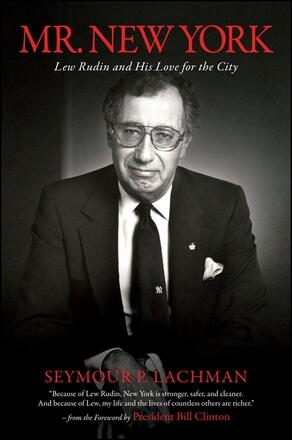
Mr. New York
Lew Rudin and His Love for the City
Alternative formats available from:
The life and times of an instrumental figure in New York City’s recovery from the fiscal and social crises of the 1970s and 1980s, and in the general revitalization of the city over two generations.
Description
Lew Rudin was one of New York City's most influential power brokers in the latter part of the twentieth century, but he was also one of its most indefatigable boosters. Born in the Throgs Neck section of the Bronx on April 4, 1927, Rudin rose to become cochairman, with his brother, Jack, of one of New York's oldest real estate dynasties, Rudin Management. It is for his civic involvement, however, that he is best remembered. Whether helping to get the New York City Marathon off the ground, or rallying corporate and labor leaders to come to the city's aid during the fiscal crises of the 1970s, Rudin worked tirelessly on behalf of the city he loved. The Association for a Better New York, which he founded in 1971 in response to growing concerns about the city's decline, continues to play a vital role in virtually every area of municipal life, from transportation to education.
In Mr. New York, Seymour P. Lachman chronicles Rudin's life and interesting times, and his love affair with the city he never ceased to believe in. Drawing on published materials as well as personal interviews with family members, business associates, and federal, state, and city officials, Lachman paints a portrait of a man who, by the time of his death in 2001, had truly earned the nickname "Mr. New York. "
Seymour P. Lachman served as President of the New York City Board of Education and University Dean of the City University of New York before being elected to the New York State Senate, where he served five terms. With Robert Polner, he is the author of The Man Who Saved New York: Hugh Carey and the Great Fiscal Crisis of 1975 (also published by SUNY Press) and Three Men in a Room: The Inside Story of Power and Betrayal in an American Statehouse. He is currently Dean of the Hugh L. Carey Institute for Government Reform at Wagner College, Staten Island, where he is also a Distinguished University Professor of Government in Residence.
Reviews
"Lew Rudin's life is a gift that keeps on giving, through the work, generosity, and friendships of his family and through the inspirational example he set for other successful people: if you do well, you must also do good. Because of Lew, New York is stronger, safer, and cleaner. And because of Lew, my life and the lives of countless others are richer. " — from the Foreword by President Bill Clinton
"Presidents, governors, and mayors knew Lew by his first name, and US senators and representatives always returned his calls. There are families in every city that have nobility attached to them. The Wagner family is one of them and the Rudin family is one also. They take the position that the city is bigger than all of us and needs all of us to attend to its needs. " — Mayor Ed Koch
"Some people put on airs. Some people are condescending in their positions in life, but not Lew. Lew could be with a queen, with a king, it didn't matter—it was always Lew. Lew was himself, and that is a remarkable trait. " — Matilda Cuomo
"Lew Rudin was a wonderful man. I never had any reservation about doing business with the Rudins. They were elegant. The family has integrity, character, and whatever they did was ethical. " — Kenneth Langone
"Lew Rudin in good times and bad times stood out for the good things of New York. He dropped everything to fight the good fight for the city. He was a remarkable person. " — Howard Rubenstein
"Lew Rudin was a patriotic, dedicated person and a great public servant. " — Henry Kissinger